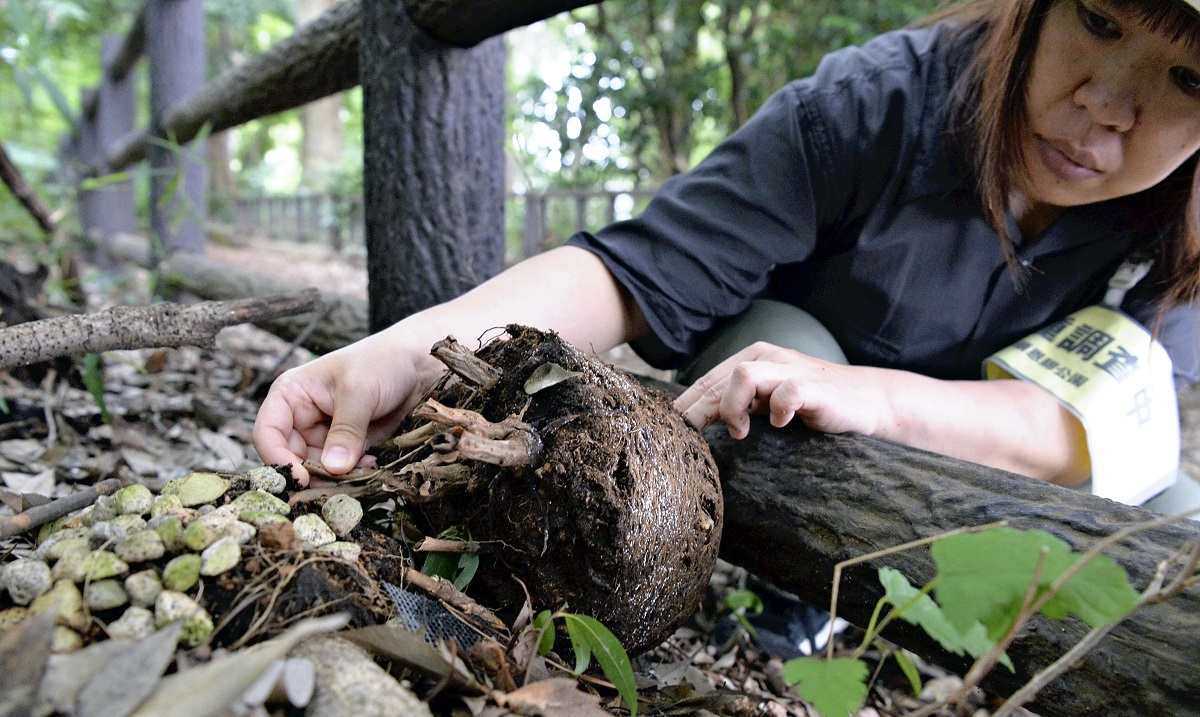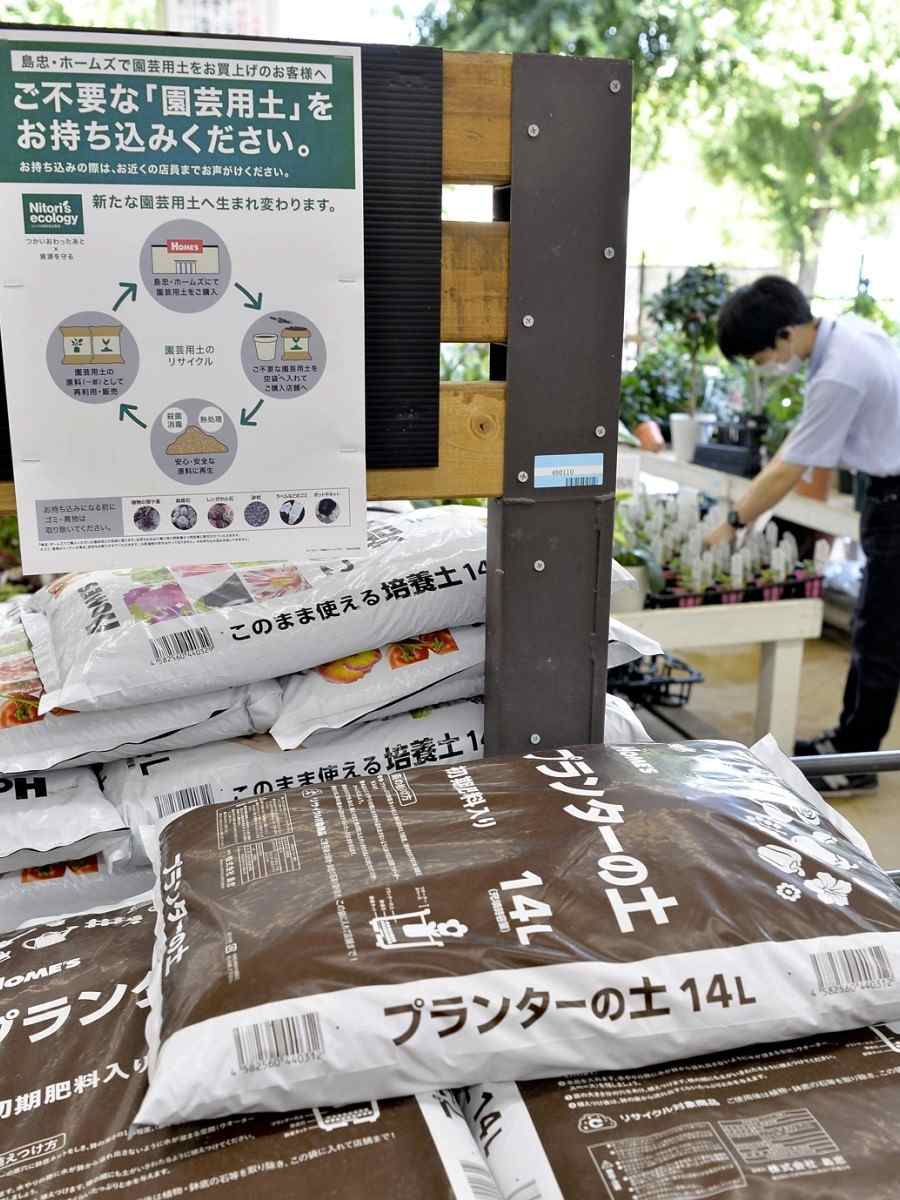Rising Popularity of Gardening Leads to Increase in Soil Dumping; ‘Dumping the Waste Does Not Mean Returning Soil to Nature’

Garden soil is seen dumped on the side of a road in a low-traffic area at Inokashira Park in Tokyo in July.
10:00 JST, October 17, 2024
The COVID-19 pandemic led to an increase in the number of people who enjoy gardening at home, but there have been cases of garden soil being dumped in parks without permission. It is believed that people have done this because the soil cannot be disposed of as general waste, but the act is just as problematic as littering.
Local governments and others who have started to collect the waste are asking people to enjoy gardening while considering proper waste disposal before they start.
On a day in mid-July, a lump of soil in the shape of a flowerpot was found among grass and plants on a quiet path in Inokashira Park, a metropolitan park that straddles the cities of Musashino and Mitaka in Tokyo. The soil, found with small stones and nets — both used in flowerpots — looked like garden soil.
Soil different from the park’s ground has been found scattered around grass and tree stumps at 20 to 30 locations in low-traffic areas within the park, according to the Inokashira Kansatsu-kai, a citizens’ group that works to preserve the park’s environment. The group said this became noticeable around the time of the pandemic.
Disposing of garbage or waste in metropolitan parks is prohibited under a Tokyo metropolitan government ordinance, but littering remains rife despite the metropolitan government’s regional office putting up notices and signs.
“The roots of the plants left in the dumped soil can breed horticultural varieties of plants that do not grow naturally in the park, collapsing the ecosystem,” said Eri Numamichi 45, a member of the group. “Dumping the waste does not mean returning the soil to nature. I want people to dispose of it responsibly.”
More people took up gardening at home during the pandemic, as people stayed at home.
In a 2021 survey of 2,560 men and women of various ages, “growing vegetables and other gardening” was the third most popular of 54 hobbies taken up during the pandemic. The survey was conducted by the B&G Foundation, a Tokyo-based public interest incorporated foundation.
It takes a lot of effort to reuse garden soil, as it becomes depleted of nutrients.
People also throw away soil when they get bored with the hobby or have excess soil. However, many local governments do not allow it to be disposed of as general waste, as it is considered “non-waste,” since garden soil is derived from nature.
There is no problem with spreading the soil in one’s own garden, but disposing of it can be a problem for people who enjoy gardening on an apartment balcony.
Collection efforts

A sign at a Shimachu Co. Home’s store says it accepts used garden soil in Nakano Ward, Tokyo.
In response to requests from residents, Tokyo’s Adachi Ward began accepting used garden soil from its residents in July. Each household can bring up to 20 liters of soil to the ward’s garbage collection offices once a month for free.
Tokyo’s Shinagawa Ward, which accepts garden soil twice a month, collected 40 tons of soil in fiscal 2023.
Taito Ward in Tokyo accepts up to 20 liters of garden soil at designated locations once a month for free. “We often hear that people brought the soil to us because they had trouble disposing of it. We want people to know that soil cannot be collected as general waste and how to dispose of it before they start gardening,” said a person in charge of the ward’s cleaning and recycling division.
Shimachu Co., which operates Home’s home improvement stores, accepts garden soil that is no longer used free of charge from customers who purchase garden soil from its stores. The company began offering the service in 2020 during the pandemic, and the amount of soil it collected has increased each year.
In fiscal 2023, Shimachu accepted about 275 tons of soil at 51 outlets in the Kanto and Kansai regions.
“Some people give up gardening because they don’t know how to get rid of used soil. We want them to enjoy gardening without worrying about where to dispose of the soil,” said Kanako Abe, a public relations official for Shimachu.
Paid waste collection
People who live in municipalities that do not accept used garden soil as waste or who cannot bring the waste to the stores they bought it from, can use waste collection companies for a fee.
Tokyo-based Wisteria Garden will visit customers for a fee to collect soil if the customers cannot bring it to the company. It also accepts soil brought to the company by customers twice a month.
Collection fees start at ¥88 per kilogram. Travel expenses need to be paid separately.
Wisteria Garden said its service is often used by people who were introduced to the company by municipalities that do not accept garden soil waste. Kenichi Fujii, head of Wisteria Garden, said about 70% of the service’s users were apartment residents.
Top Articles in JN Specialities
-

Tokyo University of the Arts Now Offering Free Guided Tour of New Storage Building, Completed in 2024
-

Exhibition Shows Keene’s Interactions with Showa-Era Writers in Tokyo, Features Newspaper Columns, Related Materials
-

Step Back in Time at Historical Estate Renovated into a Commercial Complex in Tokyo
-

The Japan News / Weekly Edition (1/30-2/5)
-

Prevent Accidents When Removing Snow from Roofs; Always Use Proper Gear and Follow Safety Precautions
JN ACCESS RANKING
-

Japan PM Takaichi’s Cabinet Resigns en Masse
-

Japan Institute to Use Domestic Commercial Optical Lattice Clock to Set Japan Standard Time
-

Israeli Ambassador to Japan Speaks about Japan’s Role in the Reconstruction of Gaza
-

Man Infected with Measles Reportedly Dined at Restaurant in Tokyo Station
-

Videos Plagiarized, Reposted with False Subtitles Claiming ‘Ryukyu Belongs to China’; Anti-China False Information Also Posted in Japan






















